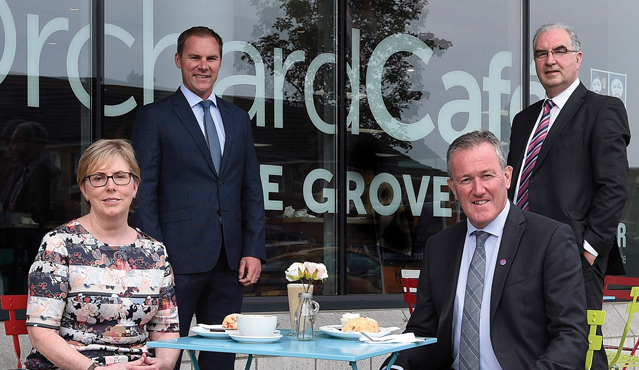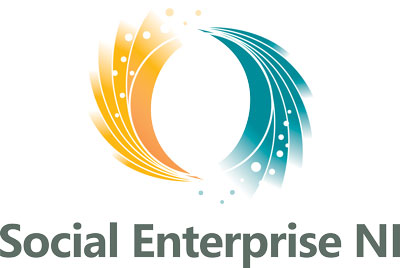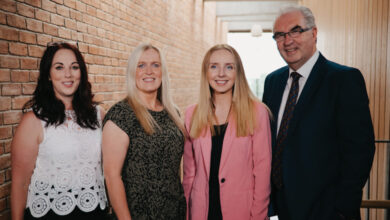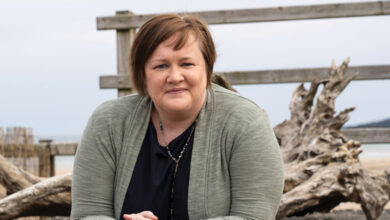Social Enterprise: The future of business

Social Enterprise NI Director Colin Jess discusses the challenges faced by the sector during the pandemic and highlights the levels of innovation utilised to ensure social enterprises continue to support those at greatest risk.
As we are all too well aware, 2020 was a difficult year for all business sectors across Northern Ireland. The social enterprise sector was no different. A year, ago Social Enterprise NI hosted an annual conference on Thursday, 5 March. As delegates left the conference, no one could at that stage have predicted what the next 12 months would have in store.
Despite the uncertainty caused by the pandemic, and not for the first time, the social enterprise sector stepped up to the mark when most needed and ‘rose to the challenge’ to support those at greatest risk, left exposed and under pressure due to the pandemic.
Social enterprises are businesses and like any other organisation they strive to generate profit with a strong commercial focus. The only difference is what they do with their profits. Profits are re-invested back into the organisation for the benefit of their social mission rather than providing dividends to individual shareholders.
Representative body Social Enterprise NI state that the sector faced up to the challenges of the pandemic and despite a delay in financial support funds getting released for the vast majority of the sector, have shown a real willingness and ability to ensuring that their service users were impacted as little as possible during this time.
Director Colin Jess says: “A large amount of time was spent in lobbying for our members and wider sector. We met with ministers and government officials, surveyed members and ultimately co-designed a support fund with social finance provider Community Finance Ireland. The original amount allocated was oversubscribed but as a result of further lobbying for additional funds, these were released to meet the demands of the sector.”
Social Enterprise NI also notes that social enterprises have a role to play when considering the spend and demands on a budget for Northern Ireland. For example, social enterprises can give the Department of Health some breathing space by their early intervention and redirecting individuals away from creating demands on the health service, to providing them with employment.
Additionally, social enterprises who work with offenders claim that those who have come through their programme are less likely to reoffend and spend time in employment, again making less demands on an already stretched Department of Justice budget.
Social enterprises stood beside their local communities and helped those most vulnerable in society who were shielding or unable to access to transport for those much-needed food and medical supplies. Social enterprises by nature will innovate and just ‘do the right thing’. Many organisations adapted early in the pandemic to show what lies at the heart of their social mission.
In no particular order, some examples of innovation are:
- The Resurgam Trust stepped up in the early days of Covid-19 and amongst many initiatives, converted their Social Enterprise Bar into a soup kitchen providing over 17,000 meals to those within their community.
- Millburn Community Association offered daily hot meals for the elderly and vulnerable, and developed a prescription delivery service in partnership with a local pharmacy.
- Bolster Community in Newry coped with a 70 per cent increase in service requests and delivered over 10,000 engagements. Additionally, during Covid-19, they carried out a successful rebranding of their business.
The list goes on. The NOW Group, USEL, Orchardville, Stepping Stones NI, Fox and Bean, The Quirky Bird, Superstars, Olive Lane & An Creagan have excelled in delivering catering to those in need, not to mention IncredABLE in Lurgan, who won the contract to operate the catering facilities at the new leisure centre at South Lakes, Craigavon. Indeed, also of note, Orchardville were successful at public tender and are contracted to provide the catering facilities for Castle Buildings.
Then we have others such as Madlug CIC who entered a social partnership with a worldwide brand, IKEA, providing bags to 12,876 staff members across the UK, a great indication of the commercial business focus within the sector.
CAN created their own TV channel reaching up to 750,000 per week across the world and Books by Stellas linked with Refuge Hot Chocolate to create a Christmas hamper. Employers for Childcare lobbied successfully for childcare needs to be recognised during the pandemic, East Belfast Mission rolled out further assistance to those in need and organisations such as Kinship Care, Oasis and Arc Healthy Living ensured that they supported local families at a time of most need. As the pandemic continued, Inspire, TAMHI, RCity, The Hummingbird Project and GLL stepped forward to ensure the health and wellbeing of individuals was being looked after as well as Healthy Kidz who delivered a global virtual sports day during to over 25,000 pupils in 500 schools. Wee Chicks, Studyseed and Science Starz also ensured that children’s education was being looked after.

Mugshots, despite restrictions in accessing Hydebank, continued their work with offenders to ensure their programmes continued and Turnaround Project announced a new social partnership with Alpha Housing. Clearer were hit by the impact of Covid on the hospitality sector, however, turned this into an opportunity and ‘pivoted’ their business model to produce sanitiser, a great example of the innovative approach which prevails within the social economy.
Ledcom, Work West, Workspace, Ortus, East Belfast Enterprise, Fermanagh Trust and many Enterprise Agencies coped with the difficult conditions in supporting their tenants in every way possible. Viable Corporate Services and Kith n Kin provided invaluable financial and HR support to the sector.
These are just examples of the work carried out with over 800 organisations across the country with similar stories to tell and Social Enterprise NI are proud to support them.
It is clear that the activities listed above show the benefits that social enterprises can bring to the wider Northern Ireland economy. The sector, as a business model, is attracting interest from more and more organisations across the private and public sector. Social partnerships are being developed, bringing a collaborative approach to delivering support and best practice to situations which are facing everyone.
Social Enterprises NI believe that it is clear that we have to do business differently. We need a collaborative approach, using the skill sets which are available across all sectors for the common good.
If you want to hear more about social enterprise and learn how to support these businesses, please get in touch. We must find a new way of doing business. Buying with social purpose and reinvesting profits back into society should be considered by all.
To learn more about the sector and how to ‘Buy Social’, go to our directory website www.buysocialni.org.uk. Additionally, if you are a social enterprise and not yet a member please get in touch and join the movement, or indeed an organisation from outside the sector who want to work with our members and support their work please get in touch and sign up for membership.
Social Enterprise NI would be delighted to have you onboard.
T: 028 9046 1810
E: info@socialenterpriseni.org
W: www.socialenterpriseni.org






